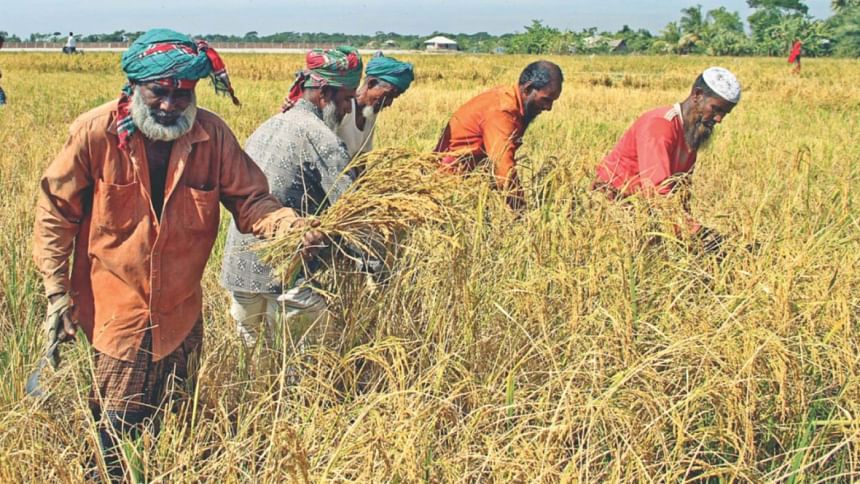Why we should let our demographic lead the way

When WHO declared Covid-19 a pandemic, many organisations immediately called for ideas on what to do as there was no doubt that an economic disaster was looming. Most measures focused on keeping the economy alive through low interest loans and financial services—all immensely important for keeping businesses buoyant and ensuring a rebound after the crisis. But a key characteristic of Bangladesh is its huge and dense population, one without the safety-net services and support that developed nations can provide to their people. Therefore, this crisis is bound to culminate into a humanitarian disaster for us, leading to people at the bottom of the pyramid living in poor health, hunger and generally low well-being.
While on the one hand we use social-distancing measures, testing and other healthcare services to directly address the pandemic, on the other hand we are also aiming to help the economy survive and remain resilient. Right now, making sure that essential services continue to be provided is crucial, as this will mean people are safe and can survive without "handouts". Yes, without handouts. It is not to say that the efforts of different organisations and individuals alike to aid people who have lost their jobs and livelihoods should be stopped. These are essential in the short run, although, development experience and countless studies have shown that directly giving cash to people might work better than providing food packages. For a forward-thinking approach we may want to consider more comprehensive systems—sectors like telecommunication, transport, agriculture and labour-intensive industries.
Let's start with the agriculture or the food sector. We have seen farmers in rural areas not being able to sell their products because there aren't enough buyers and transport from rural to urban areas due to the general holiday. This means that in urban areas, prices are going up, making things difficult for the poor even though there is enough food in rural areas. On the other hand, farmers who are not being able to sell are getting poorer. As a result, farmers will not have the money to buy seeds, fertilisers and other materials for the next harvest, which could lead to a real shortage.
If the flow of goods from rural to urban areas is increased, farmers could earn enough to invest next season and food prices can also be kept stable. With that in mind, import of farming material should be subsidised for next season. And for the next one or two years, the government should try to get more open pollinated variety (OPV) seeds. Hybrid is expensive and cannot be reused, OPV has less yield but can be replanted without buying new seeds—that is what we need now, cheaper seeds that can be re-used. The government and multilateral organisations should collaborate to support seed companies to expand and extend their distribution networks to reach more farmers.
Similarly, the production of PPE will continue to be important until most of the world can be vaccinated. This implies a steady demand for PPE which some of our factories already produce; and potentially others too can.
Companies should now restructure their CSR activities to support the governments in this crisis. Mobile operators could give free airtime to the poor. And the benefits could be two-way as these networks can provide data that will help determine who needs what kind of support and how to reach them. Keeping communication lines alive is also very important to ensure that news and information have a way of reaching those who are stuck in slums without televisions and access to information. Investing in increasing the reach of bkash and other money transfer services would be useful. It is high time we brought in our low-income unbanked population into the formal financial sector backed by telecommunication services. While it is inevitable that we will go through a recession, the idea should be to make sure people do not suffer through it and die of hunger or starvation.
When the economy starts to reopen, and it must happen gradually, the government should initiate projects to employ people. Construction, real estate and factories—anything that needs a large number of workers—will be essential for our recovery. The gig economy will also be key, as it could be a source of mass employment.
Because we have a small pool of funds, its judicious use is vital for us to weather this crisis. The World Bank has predicted a 22 percent fall in remittances due to Covid-19, and Bangladesh still remains significantly dependent on remittances. To resend our workers abroad, we need to inspire confidence among countries that need them. This could include testing facilities at airports or before travel.
The truth it is that while the pandemic has left us in unchartered waters, old debates on letting go of the one-size-fits-all theories are all the more valuable now. We need to look at our demographics for guidance, our internal systems and decide what's best for us. The good news is that past calamities have shown us to be a resilient people.
Sharmin Ahmed is a consultant at IFC working on agriculture advisory. Sadia Ahmed is an economist who has worked in economic development projects in countries across Africa, Asia and East-Europe.

 For all latest news, follow The Daily Star's Google News channel.
For all latest news, follow The Daily Star's Google News channel. 



Comments